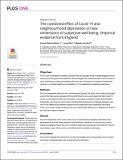The combined effect of Covid-19 and neighbourhood deprivation on two dimensions of subjective well-being : empirical evidence from England
Abstract
Objectives The Covid-19 pandemic is hitting societies hard, and people living in disadvantaged circumstances are among the most affected. We investigate the combined effects of the Covid-19 crisis and living in a deprived neighbourhood on two dimensions of subjective well-being: hedonic (i.e. mental health) and evaluative (i.e. life satisfaction) subjective well-being. Methods We use longitudinal data from the Understanding Society UK panel. We combine data gathered in the main survey between 2015 and 2019 with very recent data from the Covid-19 online survey between April and July 2020. Leveraging a sample of nearly 9,600 English individuals, we first run a set of cross-sectional OLS regressions to analyse changes over time in the relationship between neighbourhood deprivation and subjective well-being. Then, as our main model of interest, we use a fixed effect difference-in-differences model to provide more robust evidence. Results Since the beginning of the crisis, both levels of hedonic and evaluative well-being have decreased as a result of the pandemic and lockdown. However, for those living in more deprived neighbourhoods the level of hedonic well-being decreased more than for those living in better areas. We found no such difference for evaluative well-being. Conclusion Our results highlight the importance of reducing neighbourhood inequalities as the spatial clustering of disadvantages has increased by the pandemic.
Citation
Bonomi Bezzo , F , Silva , L & Van Ham , M 2021 , ' The combined effect of Covid-19 and neighbourhood deprivation on two dimensions of subjective well-being : empirical evidence from England ' , PLoS One , vol. 16 , no. 7 , e0255156 . https://doi.org/10.1371/journal.pone.0255156
Publication
PLoS One
Status
Peer reviewed
ISSN
1932-6203Type
Journal article
Description
Understanding Society is an initiative of the Economic and Social Research Council and various Government Departments, with scientific leadership by the Institute for Social and Economic Research, University of Essex, and survey delivery by NatCen Social Research and Kantar Public. The research data are distributed by the UK Data Service.Collections
Items in the St Andrews Research Repository are protected by copyright, with all rights reserved, unless otherwise indicated.

